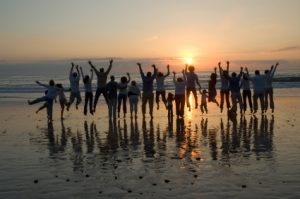
As I write this, there is an oil spill off the coast of Southern California. Tens of thousands of gallons of toxic sludge are killing wildlife and wreaking havoc on the environment. Yet oil spills and leaky pipes are nothing new, as dependency on fossil fuel goes hand in hand with environmental disaster. This horrible, and predictable, collateral damage is the very ugly side of the relationship we have with our automobiles, planes, and other fossil fuel—powered machinery and the convenience and mobility they bring to daily life.
When these disasters happen, many of us get upset and may even want to do something helpful. Yet I have often wondered why, when the current catastrophe is over, the majority of us simply go back to ignoring, or forgetting, or not caring about the ever-present onshore and offshore danger of a dependency on fossil fuel. Our temporary attention and alarm are quickly replaced with business as usual. It seems all it takes to close our eyes to the endless warning signs about the direction we are headed is a leak fixed, some wildlife cleaned up and released, and the news moving on to the next disaster or political standoff.
Why do we just move on instead of doing something proactive to end these disasters for good?
I have come to the conclusion that we do not know what to do. At times like these, we feel powerless. What can I, as one person, do? Feeling powerless and all alone to effect real change, we do not do what we can. We fall back on the comfort of inaction, preferring to believe life is really fine no matter what is happening around us. That disasters like these, unless they are in our backyard, do not really impact us, or they are not really that bad, or someone else will do something. We have great sympathy for others experiencing disasters far from us, but we do not dig deep enough to empathetically sit beside one another in the truth that if a crisis impacts other people and forms of life, it impacts us, too.
I believe the motivation to move on so quickly stems from the avoidance we developed as children when facing hurt, abuse, or difficult challenges. Because we were powerless to stop what was happening, we did not know what to do. The only thing we could do was escape, most often emotionally. Many of us created a fantasy world with the perfect family where everything was fine. A world filled with the magic of unicorns and the warmth of rainbows. But nothing in the fantasy world helped change the real world in which we lived.
Now that we are adults, I believe it is healthy for us to admit we have never met a unicorn or found a pot of gold at the end of a rainbow. Which means it is time for us to face reality. It is time to accept that we are not without power over our choice to consume fossil fuel. Maybe we take positive action, like installing solar panels on our home, purchasing an electric automobile, taking public transportation, walking, or selling our oil company stock and investing in renewable energy. With a little effort and care, we will discover numerous small things that, when done by many people, will create a big difference in dealing with the fossil fuel challenge impacting us all.
I will do as much as I can. And I will leave what you can do to you.
But please remember that together we are not powerless. We are powerful! The small changes you and I make to our dependency on fossil fuel will help move us to a clean, sustainable planet for our children and theirs. Together we can be part of the solution, rather than continue to fuel (pun intended) the destruction of our outer environment. We do not have to leave this issue to our children.
